A Very Short Play
Personnage: WYNONA or WOMAN (W); MAN or MICHAEL (M); WAITER (WAITER)
[The author herewith offers his profound apologies
to all actors and actresses who should feel that he has given them too
little freedom of expression by including so many stage and acting directions.
The author considers Freedom of Expression one of the most important Human
Rights, topped, however, by the Right Not To Listen. The author has, in
his time, stood on stage himself and therefore suggests to deal with stage
directions as he used to do: throw them to the wind, and should they come
flying back, try as hard as you can to ignore them. Exit the author, pursuing
a beer and knowing that this Shakespeareanen misquote is an aged pun.]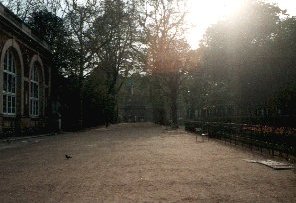
[The inside of a French café or bistro. Background noise - conversations, clinking glasses, music (not too obviously ĎFrenchí) hopefully create the impression of the café being fairly crowded. A couple, the man in his early forties, the woman a few, maybe five, years younger, ENTER, take their autumnish or early-springish jackets off, and sit down at a table.]
WOMAN [urgently]: Thereís more pigeons now.
MICHAEL: Eh?
W: Thereís more pigeons now than ever; I wonder who looks after these birds?
M: Thereís a man on the pavement, heís working for the government.
W [confused]: Where?
M: The man in the gabardine suite; heís a spy.
W [laughing a short, aggressive laugh]: Yeah, and his bow-tie is really a camera. [Short pause.] You always do this. You always do this to me. Every time I want to talk to you. Every time I wanna talk to you about something, you confuse me with your used up lines from Dylan songs.
M: Simon and Garfunkel.
W [frustrated, weakly]: Whatever. [Pause.] But I want to talk to you. To you, do you hear me? Not to Paul Simon or Robert Zimmerman ot Neil Young or fucking Sam Shepard. I want to talk to you. About something.
M: About birds.
W: Yes, about birds. About birds and cats and dogs and about the weather and about philosophy and poetry and politics and about our neighbourís new lover and about psychology. [Pause.] We used to do that, you know. Remember? Talking? [Opens and closes her hand in a Ďtalkingí movement.]
[A waiter, dressed in classic black-and-white, shirt-and-waistcoat attire, comes to the table. MICHAEL uses the opportunity to escape an answer. The woman looks through the window (yes there is a window. If there isnít, she has to create the impression that there is one).]
M: Deux cafés au lait, síil vous plait. Et un paquet des Gaulouises.
WAITER: Gauloises blondes?
M: No, the strong ones. Tabac noir.
WAITER: Va bien.
[The WOMAN still looks out of the window and watches the pigeons (yes of course there are pigeons. They may be imaginary pigeons, but there are pigeons. Sheís an actress, godammit). There is a long pause, during which the WAITER returns with the coffees and the cigarettes. MICHAEL opens the packet and puts a cig in his mouth, fumbling in his pockets for a light. The WOMAN tries to ignore him, but she finally takes a packet of matches from her handbag and tosses it over to him. Then she turns back to the window. He lights up.]
M [while lighting his cigarette]: You were saying...?
W [turns back to him abruptly. She speaks with an almost whispering, but dangerously angry voice that gets louder during the next sentences]: No, you were saying. Your turn to talk. Itís your fucking turn to talk. You have been mute since we came here, dumb since we crossed the French border, and here we are, sitting in a fucking romantic café in [exaggerated French pronounciation] Paris, and all you do is quote your shitty lines from shitty songs and shitty plays. For Godís sake talk! [Quite a long pause.] OK. Fine. Then at least tell me why you are silent. Is it Paris.? You didnít want to come here in te first place. I talked you into it. Is it Paris? Is that why you are so... [spitting the word out] different?
M: I will die in Paris on a rainy day.
W [laughing shortly and very aggressively]: Yeah sure. Fuck you.
M: It will be a Thursday.
W: Fuck you. Just another goddam song.
M: A poem.
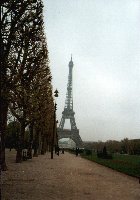 [The
WOMAN stares at him emptily and aggressively (if thatís possible at the
same time) for some seconds. Then she grabs her coat and handbag, gets
up and leaves without a word. Just after she EXITs, she reENTERs, returns
to the table, throws some coins on her saucer, and EXITs again. If there
is a window, we can see her walk away from the café with energetic
pace, not looking back. MICHAEL remains at the table, sipping first his,
then her coffee. He would smoke several cigarettes, if this wouldnít result
in trouble with the Safety Officer of the theatre and the health-fanatics
in the audience. After a while, he grabs one of the papers that the café
provides for its guests and disappears behind the pages. Unnoticed by
him, the WOMAN reENTERs. She does not sit down, but stands behind her
chair, holding a little book in her hands that looks like a diary. Sheís
patiently waiting for the MICHAEL to reappear from behind the paper. When
he does, and consequently notices her, he shows almost no visible reaction,
but he offers her the packet of cigarettes. She does not take one, but
remains motionless. Finally, he breaks the silence.]
[The
WOMAN stares at him emptily and aggressively (if thatís possible at the
same time) for some seconds. Then she grabs her coat and handbag, gets
up and leaves without a word. Just after she EXITs, she reENTERs, returns
to the table, throws some coins on her saucer, and EXITs again. If there
is a window, we can see her walk away from the café with energetic
pace, not looking back. MICHAEL remains at the table, sipping first his,
then her coffee. He would smoke several cigarettes, if this wouldnít result
in trouble with the Safety Officer of the theatre and the health-fanatics
in the audience. After a while, he grabs one of the papers that the café
provides for its guests and disappears behind the pages. Unnoticed by
him, the WOMAN reENTERs. She does not sit down, but stands behind her
chair, holding a little book in her hands that looks like a diary. Sheís
patiently waiting for the MICHAEL to reappear from behind the paper. When
he does, and consequently notices her, he shows almost no visible reaction,
but he offers her the packet of cigarettes. She does not take one, but
remains motionless. Finally, he breaks the silence.]
M: That is my diary.
W: Yes. [Pause.]
M: Where did you find it?
W: Where you left it. [Short pause.]
M: Did you read it?
W: Some of it, yes. [Short pause.]
M: Why did you take it?
[The WOMAN puts the diary down on the table in front of her and sits down, without taking her coat off. She is very matter-of-fact now.]
W: Because I wanted to find out whatís wrong with you. Why you donít talk.
M: The words of the prophets are written on the subway walls.
W [stays calm, though with a little effort]: ...and in this diary [smiles weakly]. [Short pause.] So she was your great love, eh? [Short pause.] Here in Paris. [Short pause.] I should have known that. Of course! [Ironically:] Paris, city of lovers. And I insisted on coming here. [Short pause.] But you could have told me, you know. You could have talked.
M [looking down on his coffee-cup from now on]: You donít understand.
W: No, I donít understand. Why? Because you are not explaining. How can I even try to understand if you are not explaining?
M: You wouldnít understand.
W: Fuck, Michael, I am not stupid! I am not a child. I am not as unexperienced as you seem to think I am. And you know that. We used to talk about things like that. About our lives. Before we met. We used to talk about everything. [Short pause.] Well, I talked about everything.
M: So did I.
W: Not about this [putting her hand on the diary with a little slap].
M: No.
W: Why not? [No answer. More urgently:] Why not?
M: Just because... you wouldnít have understood.
W: Tell me. Tell me now.
M: You wouldnít understand.
W: Try. Remember? We used to talk. I used to understand. Understand you. Well, thatís what you said then. Try to explain.
M [looking up, straight in her eyes]: You wonít understand.
W [returning the glance, attempting an encouraging smile]: Try.
[OK, we have a kind of a flashback thing here. And yes, there is a little hint to Casablanca (can you spot it?) - but this is not Casablanca or the like. There is no fancy light-change. Thereís hardly any change, because they are still the same people sitting in the same café, talking. The background noise, however, fades out very, very slowly and leaves us with the music from the caféís stereo, which happens to be something by The Doors. Break on Through, Light My Fire, A Spy in the House of Love - take your pick. The couple doesnít have to sit at the table all the time, but this is a café, and it is unlikely to have them pace up and down while they deliver their dialogue. Thereís a little Pause.]
M: Yeah, and it was even in Spring. [Sings:] April in Paris/Chestnuts in Blossom.
W: Michael, no songs now. Please.
M: But it was right out of a song. Thatís why I think I canít explain. Itís all too clear. Too obvious. Nothing to explain, really. [Pause.]
W: You were in love with that woman.
M: I thought I was, yes. She was a student. I had just started lecturing. She was interested in my work, in the research I did for my PhD, in the literature I cared about. We shared political ideals. Fought for them together. She even liked the same crime novels as I did. And so we thought we were in love. [Pause.]
W: And you went to Paris.
M: Yes. That was sometime in the late Eighties. I was in my late Twenties. And she was 22. I wore a black sweater. She wore blue. I remember that. Why? [Not as a rhetoric question.]
W: I donít know.
M: Nor do I. [Pause.] We had a good time. Culture. Museums. Churches. Theatre. The Opera. Pére Lachaise. At Jim Morrisonís grave, we shared a joint and got arrested during the daily raid. All very romantic. [Pause.]
W: But?
M: You read it. And it is obvious. Right out of a song. We paid the bail, went back to our hotel, and continued the honeymoon, or whatever we thought that was, until she disappeared. Just disappeared. She didnít even take all of her luggage with her. I had a suitcase of used underwear to remind me of her, all the time I staid in Paris, looking for her, calling hospitals and the gendarmerie and embassy. I thought of all the things that could have happened to her. She didnít even bother to leave a note or send a letter. [Pause.]
W: Where did she go?
M: I donít know where, but I found out with whom
- a tennis player or something. Sports. Athletics. Something. Rich and
famous and beautiful, you know. Doesnít matter. Itís all over now, Baby
Blue. [Long Pause.]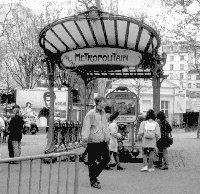
[The mood should break with the WOMANís next line. Changing the song back to something neutral and bringing the café-sounds back in would probably be a good idea. Doing it quickly could be even better.]
W: And thatís it?
M: Thatís it. I told you it wasnít much. All clear, all obvious. And yet...
W: Yes?
M: I donít know. [Pause.] It keeps nagging me. Itís in my brain all the time.
W: Why?
M [explodes, screams]: I DONíT KNOW! I donít fucking know! You keep asking and asking. [Short Pause. Then loud and quickly:] I told you you wouldnít understand. Why do you put your finger in the wound? Do you enjoy torturing me like that? Yes? Is that what you want? It happened, and I remember it. I donít know why it is interesting. [Softer.] I just donít know. [With a very low, almost (repeat almost) sobbing voice:] I donít know.
[Long Pause.]
W: You are afraid. You are afraid it could happen again. Afraid that I walk out on you.
M: No. Thatís not it. Thatís not the point.
W: What is the point then?
M [after thinking for a few seconds]: You wouldnít want to hear that.
W: Say it. Tell me. I want to hear.
M: Comparison.
W [after a Pause]: Comparison?
M: I think back of her. And I can't help comparing you.
W [lurking]: And....?
M: And I think of the discussions we used to have, me and her, and about the discussions you and me have, and it's not the same. [Pause.] We are very different, you know.
W: Weíre older. Is that it?
M [thoughtful]: Yes, maybe weíre older. More sober. More... [cynically] mature.
W: Are you... bored? With me? Is that what youíre
saying? [Getting louder, angrier.] Bored because the revolution
didnít happen, because there are no nights of discussing anarchy versus
communism? Because the last Molotov-cocktail we had was a mixture of gin
and vodka we drank in that bar in Berlin? Bored because we donít fly the
red flag together, and I donít recite the Communist Manifesto everytime
I have an orgasm with you? Is that it? [Sheís screaming now.] Well,
my pocket-size revolutionary, the last time I had an orgasm when I slept
with you was two years ago, if you want to know. [Matter-of-factly.]
So all your Jim Morrison and Che Guevara-crap is just the icing on your
midlife-crisis cake. [Pause.] Jerk.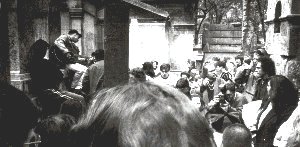
[Of course, the whole café is listening by now, which means their talking has stopped. Be a bit imaginative with the music that remains in the background (I donít have to do all the work here, do I?) and play something ironically communist. Some 1968 studentsí rebellion stuff, or a Brecht/Weill song. If you want to stick with The Doors, play Moon of Alabama. Of course there is a long pause - are there too many in this play?]
M: OK, so I am a jerk. OK, so I am in some sort of crisis. OK, so I am disillusioned. [Cynically.] I thank you for your understanding.
W: You may call it disillusioned. [Hard.] I say you are a self-pitying jerk.
M [after another longish pause]: Maybe youíre right.
[As if the audience had just waited for him admitting this, the conversations on the other tables start again.]
W [soft now, having driven home her point]: I donít care whoís right or wrong. Iím just tying to understand.
M: Guess the revolutionís over. [He lights another cigarette.]
W: Guess in your life it is.
M: Guess thatís the way it goes.
W: Guess in your life it is.
M: Guess you shouldnít be too sure.
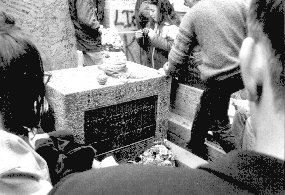 [MICHAEL
pulls a classicly bomb-shaped bomb (you know the kind: black ball with
fuse hanging out) out from under the table (now please, donít ask me where
he had it when he came in. That really doesnít matter, does it?) and lights
the fuse with his cigarette. While everybody is leaving the café
in a panic, including the WOMAN and the sound of the other people (hey,
I said Ďpanicí - can we have some screaming please?), he just sits there,
listening to the music (thereís always The Doors - When the Musicís Over
or The End. Though My Way would be a funny one. Always Look on the Bright
Side of Life is a bit too much, I guess. What the hell, play them all
at the same time!). And guess what - before the fire reaches the bomb,
the curtains close and the play is over. If there are no curtains, thereís
a little problem, since a blackout leaves the fuse burning. It could be
wet, though, and go out at the same time as the lights do.]
[MICHAEL
pulls a classicly bomb-shaped bomb (you know the kind: black ball with
fuse hanging out) out from under the table (now please, donít ask me where
he had it when he came in. That really doesnít matter, does it?) and lights
the fuse with his cigarette. While everybody is leaving the café
in a panic, including the WOMAN and the sound of the other people (hey,
I said Ďpanicí - can we have some screaming please?), he just sits there,
listening to the music (thereís always The Doors - When the Musicís Over
or The End. Though My Way would be a funny one. Always Look on the Bright
Side of Life is a bit too much, I guess. What the hell, play them all
at the same time!). And guess what - before the fire reaches the bomb,
the curtains close and the play is over. If there are no curtains, thereís
a little problem, since a blackout leaves the fuse burning. It could be
wet, though, and go out at the same time as the lights do.]
